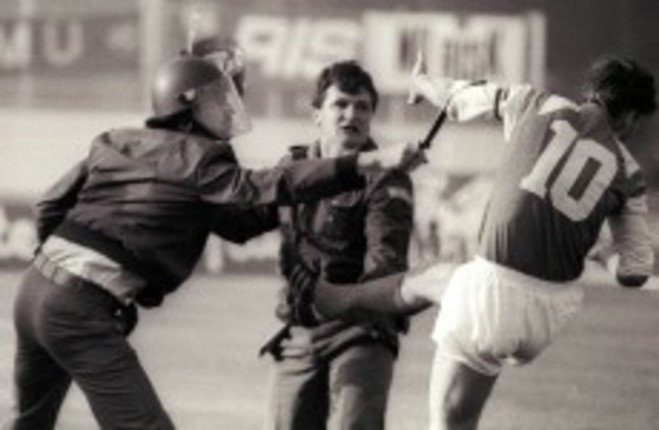CROATIA AND SERBIA’s footballers play each other for the first time since independence tonight, in a highly-charged tie given wider significance by political, cultural and historical ties and fresh memories of war.
The run-up to the Group A World Cup qualification match in Zagreb has dominated the media in both countries for several weeks and been billed the “match of the decade”.
Tickets sold out within hours and some 34,000 people are expected to pack into the Maksimir Stadium in the Croatian capital for the game, although away supporters have been banned for the tie and the return leg in Belgrade over security concerns.
“The event goes beyond sports as it is an historic first match between the two nations since their independence,” Robert Matteoni, a prominent Croatian sports journalist, told AFP.
A complex history of relations between the Balkan neighbours, marked by the brutal internecine fighting of the 1991-1995 war that claimed an estimated 20,000 lives, was an added motivation for both countries, he said. Matteoni’s view is shared by many fans, who say that any sporting encounters between Croatia and Serbia still have a significant emotional charge.
“As long as we live these will never be only pure sports events,” said Bobo, a 49-year-old member of Dinamo Zagreb’s hardcore “Bad Blue Boys” fans, many of whom joined the Croatian police and army during the conflict.
Croatia’s declaration of independence in June 1991 from the former Yugoslavia sparked the four-year war. But many believe that the conflict was heralded on May 13 1990, when Dinamo fans stood up against the Serb-controlled Yugoslav police, who looked on as visiting Red Star Belgrade supporters ripped apart the Maksimir Stadium.
During the riot, Dinamo midfielder Zvonimir Boban became a hero for Croatian nationalists by kung-fu kicking a police officer who was beating a home fan with a truncheon.
Ties between the neighbours have gradually improved since the end of the conflict but sports events are still considered high-risk, particularly with Balkan football still linked to ultra-nationalist hooligans.
Rivalry
Croatia captain Darijo Srna has described the game as his “most difficult match” while Serbia goalkeeper Vladimir Stojkovic said: “This is not only just about points…
“It’s about rivalry, prestige — and about something that will mean a lot more to some fans than to us players.”
European football’s governing body will be closely monitoring the game and the return leg on September 6 after warning both countries’ football federations about the need to tackle hooliganism.
Croatia and Serbia have been fined several times because of violence and racist behaviour involving their fans. Tight security will be in place, including stricter border controls and on all transport routes into Zagreb, police said.
Bruno, a founder member of the Bad Blue Boys, said banning visiting fans was the “only logical move” because there would inevitably be incidents if Serbia supporters were present. The head of a moderate fans group, Krunoslav Grlevic, however, said he feared there would still be anti-Serb chanting at the ground.
But with emotions running high, players and officials in both countries have tried to ease tensions.
“We are fully aware of our responsibility… our behaviour and messages that we will send can significantly influence the atmosphere in the stands,” said Croatia coach Igor Stimac. “The most important thing is that we behave as sportsmen.”
His Serbian counterpart, Sinisa Mihajlovic, agreed.
“It is football and not war that awaits us in Zagreb. We are not afraid but we have respect since (Croatia) are an excellent team,” said the former Yugoslavia international. Mihajlovic, who was born in Vukovar, the city in eastern Croatia heavily bombarded during the war, has radically rejuvenated his team and said there was no need to motivate his players for the match.
On the sporting front, the match is vital for Serbia to keep alive their hopes of qualifying for the World Cup finals in Brazil next year. Both Belgium and Croatia have 10 points but the former top the group on goal difference. Serbia are in third on four points.

